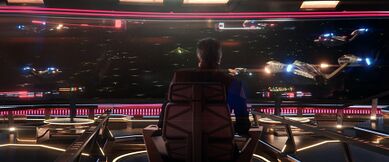Writing Primary Characters
The moment you join Bravo Fleet, you have a Primary Character. This character is the Starfleet officer assigned to one of the Fourth Fleet’s Task Forces as an up-and-coming leader and future starship commander. They are your member dossier’s In-Character (IC) representation as an officer of the Fourth Fleet. Out-of-Character (OOC), they’re the face of your member dossier, the name attached to the starship you’ll get when you make Midshipman. The ‘avatar’ as you engage with Fleet activities, progress through the ranks, and win awards. Their adventures can happen in fiction or in competitions or even just in your head, but if they’re on the dossier, they’re real to Bravo Fleet.
While you will create them as part of the joining process, we anticipate their development to be an ongoing project. It's okay to start with little more than an idea, or even just a name, and figure out where you're going as you learn more about the fleet and what you enjoy. You can also change your Primary Character. In no way are you committed to your first idea. It's okay for the Primary Character to change and grow as your participation in the fleet does, and as you rise through the ranks.
We encourage you to make your Primary Character distinct and separate from any character you’ll use if you join a Game. Even if you don’t participate in fiction writing, the idea is that you as a member represent an important, command-level officer (and, eventually, their starship) within the Fleet, not merely a crewmember. Your Primary Character is that officer.
Creation and Development
While you create a character upon joining, they don't need to be the finished article. As mentioned, it's fine to start out with a name and short paragraph. You might have a strong concept for a well-established figure in Starfleet, and want to get down hundreds of words in character background. That's fine. You might want to figure things out as you go along and start with a loose framework you can fill out later, or a character who is, as you are OOC, at the start of their journey.
It's okay to leave gaps. It's even okay to go back and change things later.
Using Your Primary Character
IC, your primary character is a command-level officer in the Fourth Fleet. But that doesn't mean you have to be a creative writer to make this so. That doesn't mean you have to churn out hundreds of words of fiction to portray their adventures or experiences. The character is no less real, no less a part of the Fourth Fleet, if your engagement in Bravo Fleet takes other forms.
Perhaps you're a gamer, or perhaps you only want to do RPGs or competitions. These are all valid forms of participation in Bravo Fleet. This makes your Primary Character an avatar for your achievements, a dossier on which you can hang your earned bragging rights through awards, ribbons, or even your Avatar Command. Many Fleet activities come in different forms with different faces - your Star Trek Online character, your role-playing characters - and if that's all you do, your Primary Character is still a unifying, IC face for your dossier. Even if they're just a picture, a name, and a character description.
Rank, History, and the Primary Character
When you join, you’re a Cadet. Soon enough, you’re an Ensign. Within a few weeks of activity, you’ll be a Lieutenant Commander. The moment you're a Midshipman, you'll be the commanding officer of your own California-class ship. How does that affect your Primary Character?
The most important point is that your dossier rank, your OOC rank, has a limited impact on what characters you can write, or what rank they hold. Anyone can write characters holding up to the rank of Captain or your OOC rank, whichever one is higher. So right out of the gate, don't let your OOC rank hold you back in your writing. After all, it would strain credulity, to say the least, for a Cadet to become a Lieutenant Commander within a few weeks - and then a couple of years later be an Admiral. You can start out writing a Captain, commanding officer of their California-class.
Of course, you can play a little more fast-and-loose. Perhaps the CO of your California is only a Commander, and you're saving 'Captain' for when you hit the fleet rank, just to make it an important milestone. Or maybe you embrace the Lower Decks of it all; sure, there's a Captain commanding this ship, but your Primary Character is running around on the residential corridor, ranking up as you do until they become a CO themselves. A more dramatic choice is to change your Primary Character as you go up the ranks. Maybe you write a young Cadet when you’re at that rank, perhaps sticking with them as you reach Ensign. You can then write a new Primary Character when you become a lieutenant, and again when you make Lieutenant Commander, or maybe again when you make Commander or even Captain. These characters don’t need to go to ‘waste’ - your starship needs a crew! You could keep your character’s background fluid, treating it as a work in progress that changes as you reach new OOC ranks. You could adjust their age and history as they rise through the ranks.
But you don't need to make it overly complicated - like we say, any member can write a character with the rank of captain. While it can be fun to explore these rank milestones in your writing, we don’t ask you to contort your storytelling around them. Respect that OOC ranks are rewards for members’ hard work and commitment to the group, and tell the story you want to tell, and you’ll do fine.

